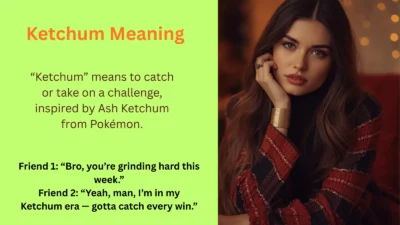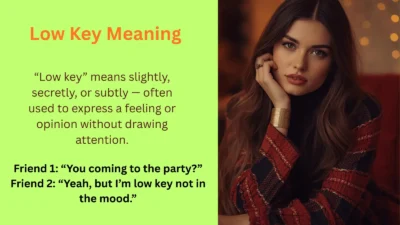When someone says they’ve “mastered” something, it’s not just about skill—it can also be slang. Master meaning often refers to someone being highly skilled, in control, or dominating a task or situation. In casual conversations, texting, or online, calling someone a “master” can signal respect, admiration, or recognition of expertise.
For example, someone might say, “He’s a master at coding,” meaning he’s extremely skilled. Or in slang, “That move? Mastered it,” meaning they did it flawlessly.
This guide explores Master meaning, its origins, usage in different contexts, examples, alternatives, and ways to respond appropriately.
What Does “Master” Mean and How Is It Used?
In general, master means an expert, someone highly skilled, or someone in control of a situation. In slang, it can also imply someone is dominant, confident, or exceptional in a particular area.
Example Sentences:
- “She’s a master at baking cakes.”
- “I finally mastered that tricky dance move!”
Key Points to Remember:
- Master = expert, highly skilled, or in control.
- Used in slang, everyday conversations, texting, and social media.
- Can describe skill, dominance, or confidence.
- Related terms include pro, guru, whiz, and ace.
Background & History
The word master has origins in Middle English and Latin, traditionally meaning teacher, ruler, or someone in charge. Over centuries, it evolved to describe expertise or authority in a field.
In modern slang, “master” emphasizes skill and dominance, often in informal contexts. For example, gamers or online communities might call someone a “master” after they complete a difficult challenge. Social media also popularized phrases like “Mastered it 👌” to show success or control over a skill.
Usage in Various Contexts
1. Texting
- “Don’t worry, I’ve mastered the new software.”
- “Mastered that recipe last night, it was perfect!”
Used to brag playfully or share an achievement.
2. Social Media
People post updates using mastered to showcase skill or progress.
Example: “Finally mastered the skateboard trick! #skills”
3. Gaming
Gamers call high-level players masters of the game.
Example: “He’s a master at Fortnite, unbeatable in duels.”
4. Everyday Conversations
- “He’s the master of negotiations in our team.”
- “After months of practice, I mastered the piano piece.”
It emphasizes expertise, confidence, and control.
Dialogue Example:
Mia: “How did you finish that puzzle so fast?”
Liam: “Easy, mastered it after last week’s practice.”
Common Misconceptions & Clarifications
Misconception: Master only refers to formal authority.
Clarification: While historically linked to control, in slang it’s about skill or expertise.
Misconception: Using master sounds arrogant.
Clarification: Context matters—used casually, it’s playful or admiring.
Misconception: Master and pro are identical.
Clarification: Similar, but master can also imply control and confidence, not just skill.
Similar Terms & Alternatives
| Term | Meaning | Tone |
|---|---|---|
| Pro | Skilled or experienced | Casual |
| Guru | Expert in a field | Neutral |
| Ace | Highly skilled, excellent | Informal |
| Whiz | Smart or talented | Playful |
| Expert | Professional skill | Formal |
Example:
- “She’s a master at chess.” (skill + respect)
- “She’s a chess pro.” (skill-focused, casual)
How to Respond to This Term
Casual Response:
- “Wow, you really mastered it!”
- “Impressive skills!”
Funny Response:
- “Master mode activated 😎.”
- “Bow down to the master!”
Professional Response:
- “Excellent work, clearly mastered the task.”
- “Your expertise is impressive.”
Encouraging Response:
- “Keep mastering those skills!”
- “You’re getting really good at this!”
Regional or Cultural Differences
In English-speaking countries, master is widely understood in both literal and slang contexts.
In gaming and online communities, it often conveys elite skill.
In professional settings, it leans toward formal recognition of ability rather than slang.
Comparison with Similar Terms
| Expression | Skill Level | Common Use | Example |
|---|---|---|---|
| Master | High | Expertise, control | “Mastered the guitar in months.” |
| Pro | Medium-High | Skilled, casual context | “He’s a pro at Photoshop.” |
| Guru | High | Expert in field | “Marketing guru” |
| Ace | High | Informal skill or win | “Ace of the team” |
| Whiz | Medium | Talent, playful context | “Math whiz” |
Usage in Online Communities & Social Media
- On TikTok: “Mastered this DIY project in one try 😎.”
- In gaming forums: “Only masters can beat this level.”
It’s used to show confidence, skill, and accomplishment. Tone matters—it’s often playful or admiring.
Hidden or Offensive Meanings
“Master” is generally neutral or positive. Historically, it had connections to hierarchy and authority, but modern slang focuses on skill, control, and expertise. Context matters—avoid using it in sensitive topics referencing historical power dynamics.
Suitability for Professional Communication
In formal environments, use alternatives like:
- “Highly skilled”
- “Expert in this area”
- “Demonstrated proficiency”
“Master” can work in casual team chats or presentations to convey skill informally, but always consider the audience and tone.
FAQs
- What does master mean in slang?
Master refers to someone highly skilled, confident, or in control of a task. - Is the master positive or negative?
Mostly positive, indicating skill, dominance, or respect. - Can I use the master at work?
Only in casual team chats; in formal reports, use “expert” or “skilled.” - What’s the difference between master and pro?
Master implies skill plus confidence or control; pro emphasizes skill. - How do you respond when someone says they have mastered something?
“Impressive!” “Well done!” or playful responses like “Master mode activated 😎.” - Is the master used globally?
Yes, widely in English-speaking regions; often in gaming and social media slang. - What’s a synonym for master?
Expert, ace, pro, whiz, or guru.
Conclusion
Master meaning revolves around skill, expertise, and confidence. Whether describing a task, hobby, or casual achievement, calling someone a “master” conveys respect, admiration, and accomplishment.
From texting to social media to real-life conversations, understanding “master” helps you communicate skill or dominance naturally. Always consider tone and context—playful, casual, or professional—to make your words effective and relatable.





